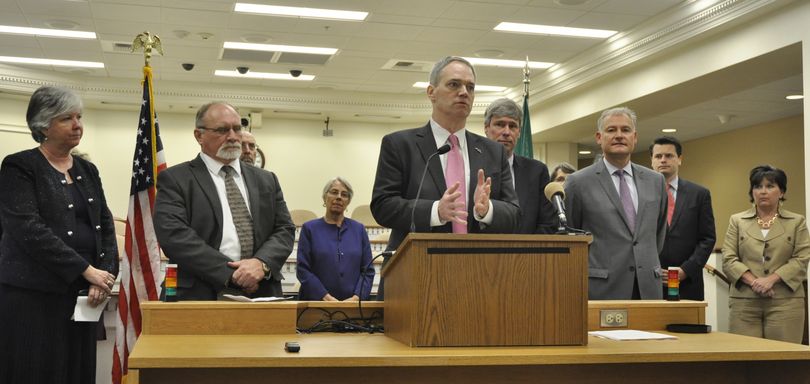House Democrats offer ‘significant compromise’ budget

Rep. Ross Hunter explains a point in the new House budget proposal, flanked by other Democrats from the Senate and House.
OLYMPIA — House Democrats offered to trim back spending and drop many proposals on taxes as part of a compromise they say would allow the Legislature to pass a 2013-15 operating budget before time runs out in the special session.
The $33.6 billion plan for the next biennium spends an extra $700 million on public schools in an attempt to meet a state Supreme Court mandate, although less than their leaders proposed at the beginning of the year.
It closes fewer tax exemptions and preferences and would not extend a business and occupation tax surcharge or higher taxes on beer that are scheduled to expire at the end of the month. A separate proposal would close or reduce seven tax exemptions, raising an estimated $256 million. That money would be dedicated to specific programs in public schools or colleges if they pass as separate legislation. . .
To read the rest of this item, or to comment, click here to go inside the blog.
. . . “We need to come to common ground,” Rep. Ross Hunter, D-Medina, chairman of the House Appropriations Committee said. “This is a very large move in that direction.”
Senate Democrats and Gov. Jay Inslee, who recently expressed frustration at the slow pace of budget negotiations, praised the proposal. Jim Hargrove, the chief budget negotiator for Senate Democrats called it “a significant move.”
Sen. David Frockt, D-Seattle, called it a bold move toward the spending plan Senate Republicans have proposed by significantly dropping calls for new tax revenue. Whether it can pass the Senate is unknown, he said, but “it's a good strategic move.”
But the coalition of 23 Republicans and two Democrats that holds the 25-24 majority in the Senate, was less enthusiastic.
“I'm disappointed that this House budget proposal is balanced on the backs of Washington's school children,” Sen. Rodney Tom, D-Medina, the majority leader, said in a prepared statement. The coalition “will not let political expediency get in the way of fulfilling our obligation to provide for our schools.”
Sen. Andy Hill, R-Redmond, the coalition's budget chairman, refused to comment on the proposal after it was released: “I'm off to negotiate in good faith,” he said.
Rep. Gary Alexander of Olympia, the ranking Republican on the Appropriations Committee, called the proposal a good step toward a compromise, but questioned the way the plan was released, which he described as “negotiating through the media by staging press conferences.” The plan should have been brought to the negotiating table, he said.
For more than a month, legislators and Inslee have refused to reveal any details of budget proposal being passed back and forth, saying they wouldn't negotiate in the news media. House Democrats began their press conference to describe the new budget proposal with a disclaimer by Majority Leader Pat Sullivan of Covington that they were not negotiating in the press.
Instead, Sullivan said, they were releasing the proposal in advance of Wednesday afternoon's hearing in the House Appropriations Committee. “The only way we can complete our work is to begin the process,” Sullivan said.
It typically takes the House three days to review and pass a budget and another three days for the budget to get through the Senate. The special session is due to conclude on June 11.
Under the House Democrats’ proposal, state colleges and universities would be limited to a 3 percent increase in tuition. Public schools throughout the state would get an extra $434 million for materials, supplies and operating costs, $208 million to reduce class sizes between kindergarten and grade 3 and $108 million to expand all-day kindergarten.
It would repeal the sales tax exemption for high tech research and development, require out of state shoppers to file for a rebate rather than giving them the break at the register, and apply the standard sales tax to bottled water. The bottled water sales tax was rejected by voters in 2010.
